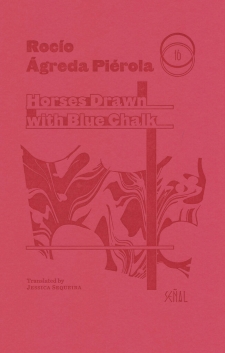ni pienses en saber rocio
don’t even think about knowing rocío.
In the original Spanish, the above verse can only be read as a warning to the self. In the English translation, it can be that, but it can also serve as a warning to the reader, like the sign the child puts on the door of their room for others to keep out. Sequeira, by remaining faithful to the original text—she could have, for purposes of clarity, added a comma in front of rocío—augments its meaning-making potential, as the line now carries both possibilities: the threat to the self and that to others. This imbues the verse—and the poem—with a level of indeterminacy that is, at least for this reader, arresting. Furthermore, this subtle show of restraint and fidelity highlights, I think, one of the major qualities of Agreda Piérola’s work: the poet introduces something daunting only to leave it at that or take it away. Agrieda Piérola, for example, writes: “In my childhood there’s a town of the future. / In my childhood there’s an angel who promised me wrath. / Now I guide myself by the cosmography / of paradise lost.” An angel of wrath seems heavy for childhood; so heavy one would expect the poem to turn and develop and/or explore this figure further. The poet, instead, is content to move on, explaining, “My language won’t put up with a vertical order.” Nor with any other sense of order, apart from whimsy—even as Agreda Piérola’s sort of whimsy is crossed with a sense of wrecking, of wreckage, of having once been wrecked or perhaps being in ever present danger of it, but assuming it with grace: “I cultivate a form of speaking that isn’t collapse, / a serpent’s language to save me / when I plummet.”
The one fixed coordinate in the poet’s work—like in the universe of a child—is the I: everything in the world seems to exist to the extent that it is of concern for the I. As such, there is nothing that is properly outside of the speaker’s grasp, nor properly outside or alien to them. The I in these poems dreams, disorders, remembers, breaks, burns, cuts out, forgives, confronts and corrals. Exactly what there is to confront and corral here is never made explicit. Agreda Piérola’s poetics is one of deviation and divination: “I shelter an error as if it were a refuge / I corral an idea that neighs and kicks to escape.” Rather than directly name what is “eating at her,” she comes at it sideways, in a perilous show of strength: “I pick out my dress my century and my country / at the exact level of my error / within that house I undo and outdo myself / I convince myself it’s been the only way century after century.” As with the angel of wrath, the speaker’s error also remains inaccessible to us. The speaker is at peace with witnesses but does not want or need confidants. The poet’s imagination is stingy that way. On the other hand, it is possible—perhaps even desirable—to read the poet’s I more generously. There is a sense of capaciousness about an I that assumes both country and century. An I that speaks of and from childhood; that stops short of spelling out inner and outer turmoil so that we may read into her spiraling our own seeming out-of-sortness: “As if everything weren’t promised to being. / As if everything weren’t perhaps on the verge / of likewise not being.”
The poems in this collection thus vacillate between attempts at containment and a sense of collapse; between a stated desire to access the past and an apparent inability to escape the past: “by my eyes there passes / the gold where the dust of my childhood home dances.” It would perhaps be a bit too convenient to describe these poems as nostalgic. They are more a work of mourning. Of the anger that often undergirds mourning. In “I’ve seen despotic words,” Agreda Piérola writes: “I’ve seen silences / ghosts of dentures / statues the mud of childhood preserves / but I’ve needed to be hunger / a well-behaved cannibal muzzled by their desire / but in every unworking I’ve seen a language / a time / a secret movement / an unknown music.”
This unknown music often comes off as static-y. Or as no music at all. It can thus be hard to figure Agreda Piérola out. In the same way that it can be hard to learn the rules of a game being made up by others as they play. But you are drawn to the game in the hopes of figuring it out. Or precisely because you won’t. One thing, though, is clear: you hadn’t come across anything quite like it.

